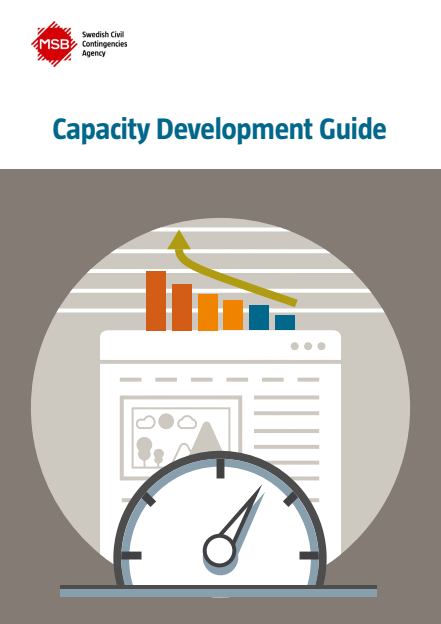Resilience Building & Capacity Development
Disasters, caused by natural hazards, occur regularly and have affected people throughout history. Disasters cause loss of lives, destroy valuable investments and threaten a sustainable development.
Climate change will result in even more intense disasters in the future and due to population growth, urbanisation and widespread poverty, more people will be affected.
MSB works in partnership with national disaster risk management organisations, regional/ international organisations and other actors, to enhance the capacity to reduce disaster risks and build resilience. Our long-term capacity development initiatives aim at strengthening capacities on individual, organisational and systemic levels and include institutional and operational support to strengthen capacity to prevent, prepare for and manage future disasters and crises.
A prerequisite for MSB to engage in development cooperation for capacity development is external funding for project implementation. The projects we carry out are funded mainly by the Swedish International Development Cooperation Agency (Sida) and the European Union.
About the resilience building projects
Our resilience building projects’ thematic foci build on the core competencies of MSB and the Swedish crisis management system as a whole – for example inter-institutional coordination, rescue services, crisis- and risk communication, training and exercises, and participation in the EU civil protection mechanism. All operations integrate gender equality, human rights and environmental perspectives, and are implemented through a solid monitoring and evaluation framework.
MSB’s capacity development and resilience building operations are guided by international frameworks such as the 2030 Agenda for Sustainable Development, the Sendai Framework for Action and the Paris Agreement, as well as by national policies and strategies forming the Swedish development cooperation together with the mandate and expertise of MSB.
Publication
Capacity Development Guide
MSB1162–January2018, 2019
Capacity development is about change and learning. We took on the development challenge from what we knew best, with a humanitarian mind-set and fix-it approach. We experienced some missed opportuniti...
Cross-cutting issues
MSB's resilience building operations shall contribute to sustainable development and strengthening resilience in the society as a whole. By integrating a gender equality, human rights, and environmental and climate change perspective into our operations, we achieve sustainable and needs-based results and ensure that we work in line with Swedish legislation and aid policy, as well as global and EU strategies and frameworks.
To measure results and to be able to adapt strategies and the design of capacity development activities to each project and partner, it is also important to have well-designed systems for monitoring and evaluation with focus on learning. MSB has internal advisors for gender equality & human rights, environment and monitoring & evaluation who are involved in all projects.
MSB has developed a broad toolbox to support project management and field staff to consider a gender equality, human rights, environmental and climate change perspective in their work. Examples of such tools include the MSB Gender Equality Toolkit and the Practical guideline for integrating gender, human rights and environmental issues in Disaster risk management.
MSB1394 Gender equality toolkit: practical advice for international operationsPractiacal guideline for integrating gender, human rights and environmental issues in Disaster risk management
Regional projects
MSB's regional capacity development projects are usually planned and implemented in a consortium with other European civil protection agencies or organisations with expertise in disaster risk management. The projects have both a national and a regional dimension, often aimed at creating a common understanding of methods and processes for how natural disasters, which are often transboundary, can be prevented and managed and can indirectly contribute to stability in the region.
Bilateral projects
The basis of bilateral cooperation is a strong partner dialogue where partners' needs in relation to the expertise MSB can offer are at the centre. These projects often include competence from the entire Swedish crisis preparedness system from the local, regional and national levels.
-
Read more about our bilateral projects
Strengthening Ukraine’s Resilience: Mine Action and Rescue Services (MARS)
Completed projects
MSB has led and participated in numerous bilateral and regional projects throughout the years. Read more about the completed projects in the list below.
-
Completed projects
Capacity for Risk management of Earthquakes and Health Emergencies (IPA CARE)
Enhanced Capacities for Resilience (ECR) in Irak
Enhancing Civil Protection in Armenia
Leveraging ASEAN Capacities for Emergency Response, LACER
IPA Disaster Risk Assessment and Mapping (IPA DRAM)
PPRD EAST 3
Final Technical Implementation Report
Union civil protection Knowledge Network
Video: Full scale exercise on forest fires TbiEx2023
Video: Hybrid Table top ExercisesInception Report PPRD East 3International Training Programme Disaster Risk Management (ITP DRM)PPRD East 3 - Interim Technical Implementation Report 2021_final ENGPPRD East 3 - Interim Technical Implementation Report 2022 - FINAL

